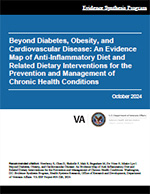
|
Recommended citation: |
Download PDF: Complete Report, Executive Summary, Report, Appendices
High-certainty evidence remains lacking for some anti-inflammatory diet patterns and some chronic conditions. This is partly due to the small numbers of original studies, the fact that most are observational in design, and the challenges of conducting long-term human nutrition studies. Moreover, the observed associations between the dietary patterns and disease risk could be due to foods excluded from these dietary patterns, foods they include, or both.
Six of 10 adults in the United States have at least one chronic health condition, such as heart disease, cancer, diabetes, dementia, osteoarthritis, and autoimmune disorders, and chronic diseases are the nation's leading cause of death and disability. Some evidence supports a role for inflammation as a contributory factor across these conditions, and other lines of evidence have supported a role for particular dietary patterns in reducing risk for some of these conditions.
We reviewed systematic reviews of the potential roles of anti-inflammatory dietary patterns—including the DASH diet, Mediterranean diet, vegetarian and vegan diets, and those with low inflammatory index scores—in the risks for several chronic conditions and for mortality, and we constructed evidence maps of the impacts or associations. Only reviews that assessed the certainty of the evidence supporting their conclusions were included. A high certainty of evidence supports a beneficial effect of the DASH diet in reducing blood pressure in patients with hypertension or pre-hypertension, compared with other diets; an association of DASH diet adherence with reduced cancer-related and all-cause mortality; and an association of better adherence to a Mediterranean diet with decreased risk of frailty and pre-frailty. Moderate certainty evidence supports a role for these diets and lower dietary inflammatory index scores in reducing the risk of certain types of cancer, cancer-related outcomes, and liver conditions; and an association of adherence to the Mediterranean diet with reduced risk for cognitive decline.